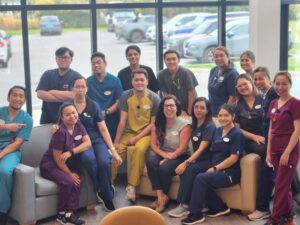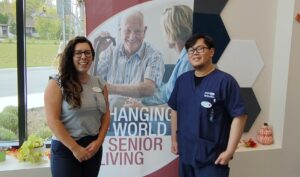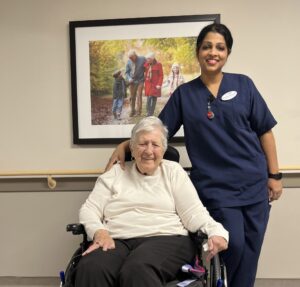Hiring IENs helps build pipeline of talent
Make hiring abroad part of your well-rounded HHR strategy
Like other Canadian healthcare organizations, one of peopleCare Communities’ most pressing priorities is hiring, onboarding, training and retaining skilled and dedicated employees.
While not unique, peopleCare’s health human resource (HHR) challenges will only intensify as the organization experiences rapid growth – with plans to build and open nine new long-term care (LTC) homes in the next four years, including three projects that are in construction right now in Tavistock, Kitchener and Delhi, Ontario. In fact, it was opening our new 128-bed Meaford LTC Home in 2022 that crystallized the urgency to implement a comprehensive HHR strategy to build the workforce we need today and in the future.
Jenn Killing is peopleCare’s Vice President of Quality, Research and Strategic Partnerships, and the operations lead opening the new Meaford Home. She says the opening was an opportunity for the organization to dig deep, get creative and think long-term. “We’re always working to build strong, committed teams of people whose values align with ours and who fit our mission driven culture,” says Killing. “When we looked ahead to opening more new homes in a short timeframe, we had to maximize all avenues to recruit new staff immediately, build a future pipeline of talent, and create sustainable retention solutions for our existing and new Homes.”
Highlights included establishing a dedicated HR coordinator role to manage the day-to-day tasks and work with the team to implement the strategy, a strong focus on attracting and hiring students, academic and immigration partnerships that build capacity upstream, and an enhanced employee engagement strategy, to name a few. “All of these things are significantly supporting our goal to ensure our residents’ needs are met by familiar, compassionate and well-trained staff who want the very best for them,” adds Killing.
Internationally educated nurses
One of our most unique and successful new initiatives is bringing Internationally Educated Nurses (or IENs) to Ontario. To date we’ve supported 30 of these highly skilled and experienced health care professionals to join our Meaford LTC team.

Highly skilled IENs have been a very positive addition to the team at peopleCare Meaford LTC
Some have LTC experience, while others have backgrounds in psychiatric nursing, ICU bedside care, radiology and more. For the next two years, all will practise as personal support workers (PSWs), helping residents with personal care and activities of daily living. Many are working towards becoming qualified to practise as a nurse, through the College of Nurses of Ontario (CNO).
Bethany Rupp is the Executive Director at peopleCare Meaford LTC and the point person who led this initiative. It was Rupp who welcomed and oriented the new team members, helping them to get settled. Along with starting early (a process we thought would take six to eight months actually took around 12 months), her top takeaway for those interested in augmenting their care team with IENs is to get help from an established partner organization that knows the ins and outs of recruiting overseas. “Don’t go through this process alone. Get a partner to help you,” says Rupp.“ There are organizations that are ready, willing and able to assist. Consider just the travel planning alone for these dozens of arrivals from all over the world. We knew this was not something we could take on ourselves.”
The consulting agency peopleCare worked with selected and prescreened candidates based on our criteria, facilitated the paperwork required by the government and supported our new hires in making their way to Ontario. peopleCare shortlisted, interviewed and selected candidates and secured temporary housing. The IENs took care of their own work permits, visa and residency applications and associated fees.
One of peopleCare’s key commitments to our IENs is to support them as they pursue professional registration in Ontario. According to Rupp, what that looks like is everything from helping them find permanent housing, to ensuring they can complete clinical placement hours in the Home if needed, to offering scheduling flexibility so they can study or sit their exams. “These are very smart, driven and accomplished people who have already tackled a lot of barriers to get where they are today,” says Rupp. “So while it’s up to each IEN to take the next steps to achieve their professional goals here in Ontario – and I have no doubt they will be successful – our team will do whatever it takes to make sure they feel comfortable, supported and encouraged.”
For instance, peopleCare partnered with the CARE Centre for IENs to host an information session that highlighted the organization’s various membership programs and services to support the IEN journey and helped explain the registration process and pathways outlined by the CNO. With funding support from Immigration, Refugees and Citizenship Canada and the Ministry of Labour, Immigration, Training and Skills Development Ontario, the CARE Centre has been supporting IENs to return to their profession, gain employment, integrate into the Ontario healthcare workplace and excel in their careers for over two decades.
Life in Canada
An added benefit of hiring healthcare staff from overseas is the opportunity to support newcomers who want to make a better life for themselves and their families in Canada, which suits values-based peopleCare’s commitment to having a positive social impact.
Kerl Ocampo is one of the first IENs who arrived in Meaford last winter. While he was born in the Philippines, and previously worked in ICUs in countries like Saudi Arabia, it was always his dream to live and work in Canada. Working with community partners, peopleCare helped to connect Ocampo and the other IENs with government, social and newcomer services and supports, not to mention local spiritual and service clubs and organizations based on their interests. “I’m looking forward to getting involved with the local church community,” says Ocampo. “I want to raise my future children here.”

Executive Director Bethany Rupp with Kerl Ocampo, one of the first IENs to arrive at peopleCare Meaford LTC in February 2023
Ensuring IENs have a place to live when they arrive is a requirement for employers. Given the housing shortage in southern Ontario, especially in rural communities, peopleCare arranged temporary accommodation for all the IENs in one location near the LTC Home. On a positive note, all have already been able to make alternative living arrangements independent of peopleCare.
Having gone through this experience together, many are now friends and either still live together in new digs or make a point of socializing after work. “Kerl recently celebrated his birthday and invited me to attend his gathering so I could celebrate and try some of his famous cooking,” says Rupp. “A whole group of our IENs were there and it was so fun to cut loose outside of work.” Rupp took a pumpkin pie to the impromptu potluck, which everyone enjoyed while playing a round or two of video games.
Amazing ROI
For healthcare organizations considering hiring IENs, Rupp says the pros far outweigh the few cons. From an operations perspective, IENs virtually eliminated the need for agency staff in the Home, which is so important to making the most of the funds available for nursing and personal care. As nurses with critical thinking and leadership skills, IENs also positively impacted the culture in the Home.
“You have to invest in the IEN program, with some of the upfront costs and the dedicated time needed to help them get settled. But trust me, it pays for itself over and over with all the benefits you get back,” says Rupp. “These amazing healthcare professionals are just so competent, positive and happy to be here caring for our residents. It boosts morale. It’s a phenomenal return on investment.”
What’s next
Creating solutions-focused staffing pathways in collaboration with government, immigration and social service partners has long been a peopleCare priority. Given our success in Meaford, the peopleCare team is working to replicate the IEN initiative across our Homes.
We also continue to collaborate with organizations like Talent Beyond Boundaries (TBB) to advocate for the legislative changes and resources needed to bring displaced healthcare workers in crisis, and their families, to Ontario. Settling entire families can have a positive ripple effect on the local economy and ease the general workforce shortage. Support from organizations like TBB helps remove barriers often faced by marginalized groups making the transition into Ontario’s labour market. Aligned with local partnerships and strategies to support long-term retention, these innovative solutions have the strong potential to become new leading practices for recruitment in LTC and the health system.
Killing says the strong collective focus that health care providers and government currently have on finding sustainable solutions to the HHR crisis is also cause for optimism. For instance, consider the new legislation to remove barriers in the system. New funding for student preceptorships, nurse practitioners and education to up-skill workers, not to mention partnerships with universities, colleges and immigration agencies, are building capacity.
“We’re pleased about the positive impacts we’re seeing from all of these changes on our ability to recruit and retain staff, and we’re working hard to make the most of every opportunity,” says Killing. “Coupled with innovative solutions we are leading as part of our HHR strategy, such as hiring abroad, peopleCare is truly developing a robust pipeline of amazing leadership and talent into our sector.”
—
Article written by Sheena Campbell, Vice President of Communications and Engagement at peopleCare Communities. First published in the Fall-Winter 2023 issue of Long Term Care Today magazine, available here.
Printable version of article available here.
Life changed dramatically for IEN Sharin Cherian and her family as she pursued her dream of becoming a nurse in Canada. Read her story:
Calling to Care: One Nurse’s Family Tradition

Meaford LTC resident Norma Sonnenberg with IEN Sherin Cherian
When Sherin Cherian was young, she was touched by the heartwarming stories she heard from her aunt, a nurse in India. These were tales that gave her a glimpse into what would become her life’s work and a profound calling to care for others in need.
“My aunt always shared how satisfied she was at the end of every shift that she had made a difference in her patients’ lives. When I went into the profession, I found that’s how I have always felt too,” says Sherin. “It’s easy to be with people in their happy moments, it’s even more important to hold their hand during times of pain, to ease their suffering and make them feel truly cared for.”
Flash forward 17 years and Cherian is an experienced and skilled nurse who speaks no less than five languages. She is living in Ontario and practicing as a personal support worker (PSW) in peopleCare’s Meaford LTC Home – one of dozens of Internationally Educated Nurses (IEN) bringing their expertise and joy in caring for others to the team, while pursuing their nursing credentials in this province.
Cherian previously spent 15 years as an ICU cardiac nurse for Kuwait’s Ministry of Health. While there, she and her husband Shibin Varghese Davidson, a mechanical engineer, raised their family including 12-year-old Joshua and 10-year-old Joanna – who wants to be a nurse just like mom.

Sherin Cherian and family, including husband Shibin and children Joshua and Joanna.
That drive for a better life is what eventually brought Cherian to Canada, after the family made some tough choices. “I don’t question this was the right decision but initially it was hard. This is the first time my family and I are separated, which is really shattering. I changed professions to work as a PSW, I moved to a new country. It’s just a huge transition overall.”
With her husband still in Kuwait and her children staying with extended family in India, Cherian keeps in touch through regular video chats. She is buoyed by her family’s love and support and has complete trust and confidence that her kids are well-cared for by her mother-in-law, who worked as a nurse for over 30 years.
Cherian also appreciates the supportive atmosphere in the LTC Home and the respect of her new peopleCare colleagues, saying it has made the big move a little easier and how much she enjoys working in LTC, which is very different than the acute setting. “Here you can create long-term relationships with residents and families, who are always appreciative and giving positive feedback. And I love that everything is so resident-centred. I feel I can go deep into their hearts, with my touch and my words, making them calmer and happier.”
Earlier this month, Cherian passed her registered nurse exam, the first of peopleCare’s IENs to do so. With that behind her, she and a fellow IEN are apartment hunting and she welcomes the chance to relax by doing a little home-cooking. Friends from back home, who now live in the GTA, recently came to visit and brought her the spices to cook biryani and other favourite recipes for her new friends and coworkers.
Looking to the future, life-long learner Cherian says she has always wanted to pursue post-graduate studies in nursing. And of course, she looks most forward to being reunited with her family. “I think my dreams now are simple, to work as a good RN, get my kids here and settled and have a nice family life.”

